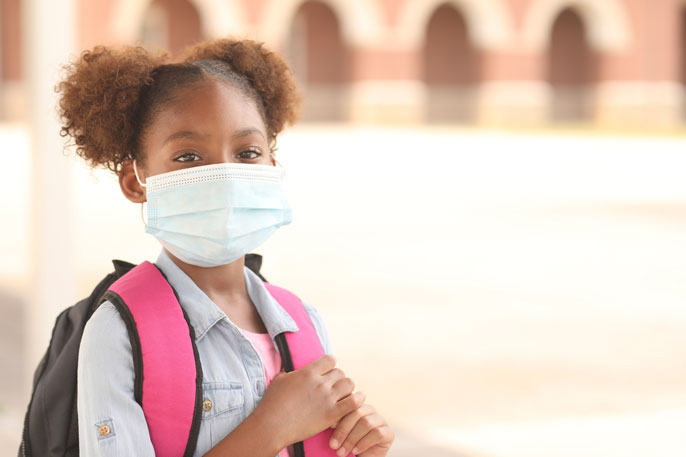

A certain level of back-to-school anxiety is normal. But there is nothing normal about this coming school year, so expect entirely new stress levels among kids, both good and bad, two UC Davis behavioral experts said Thursday (July 30) on UC Davis LIVE: COVID-19.
“Anxiety comes from the difficulty of operating with uncertainty. There is a lot of uncertainty right now,” said Breanna Winder-Patel, an assistant clinical professor in the Department of Pediatrics and a clinical psychologist at the UC Davis MIND Institute. “But anxiety can be difficult to detect with children.”
Winder-Patel and Marjorie Solomon, a professor of clinical psychiatry and a faculty member at the MIND Institute, answered questions from viewers about back-to-school anxieties kids are feeling amid the coronavirus pandemic and how to help them be more comfortable.
Some anxiety helps everyone — children, and adults — cope with their world, but too much can interfere with daily lives. The difficulty, especially with younger children, is knowing when they’re feeling too anxious.
Credit: UC Davis
What to look for

Credit: UC Davis
Sometimes kids get physical symptoms, like stomachaches or headaches. Often, they’ll show it in their behavior, such as avoiding being alone or going to bed
“Think about how they might be avoiding things,” Winder-Patel said. “We see kids not wanting to have their cameras on for a Zoom meeting because they’re worrying about, ‘What will the other kids think of me?’”
For children with autism spectrum disorder, it may be a small regression in development or other subtle changes.
“Those children often have what we call a ‘special interest,’ when they are extremely interested in Legos or Pokémon or something,” Solomon said. “Sometimes you can tell kids are extra anxious when they resort to using their special interest more.”
Not all kids are anxious

Credit: UC Davis
“Some kids are extremely anxious about so much right now, like worrying about their parents leaving to go to work and getting sick, or about missing their normal routine, but not all of them,” Solomon said. “Others feel safer. They’re in their homes, in their space, and they don’t have to venture out to school where they often have a lot of problems.”
She said parents can help by being good detectives about their kids, and by talking to them about what they’re going through.
“Parents tend to know their children really well,” Solomon said. “They can give their children a chance to voice their anxieties about going back to school or about anything to do with COVID-19.”
Coping for everyone in the house
“For a lot of kids, especially young kids, their experience is what adults convey to them,” Winder-Patel said. “If you’re saying we’re going to do some good things as a family, and we’re all going to work on being flexible and brave, that’s very different from kids getting yelled at for not staying 6 feet away or not wearing masks.”
They said to emphasize the idea that there are things they can control and focus on this — such as washing their hands, wearing a mask and keeping a social distance. That will help kids feel less anxious about the things they can’t control.
And let them know there are things they’re doing right.
“Sometimes we forget to reward children for things that went well because we’re just so relieved they went well,” Winder-Patel said. “Reward them for being flexible today when the mic went out, or for bravery. Tell them, ‘I know you didn’t want to do that video today, but you pushed through and did it anyway.’ That can go a long way.”
How to avoid projecting your anxiety onto your kids
“Sometime as parents, we feel we have to shield our kids from all the stress,” Winder-Patel said. “But kids need to experience some stress in their lives. It’s better if we model for them how we cope. Say, ‘I’d like to go for a walk, would you like to come with me?’”
And go easy on yourself. For instance, Solomon said, don’t expect to be the best home teacher on Earth if you’re not trained for it, and don’t expect to keep a perfect household. Just be open about what your kids — and you — are feeling.
“It’s very important parents keep up their own self-care,” she said. “Take those walks, have a quiet dinner with your partner. Do the things that bring you joy.”
Techniques to relieve anxiety about online school
“It goes a long way when parents work to help children know what to expect,” Solomon said.
Try these techniques to tamp down anxiety and to help them feel comfortable in their online classes:
- Don’t assume kids are ready for this. Ask if they have questions or uncertainties.
- Create a visual schedule of what their day will look like. Knowing what’s ahead is comforting.
- Use a technique called “social stories” and talk kids through some coming event that may be making them anxious. It’s a simple script about how something will unfold.
“Walk them through it,” Winder-Patel said. “Say, ‘When we get ready to go online in the morning, first we turn on our computer, then we check out the microphone and camera.’ When they’re anxious, they can go to the script and feel a little calmer.”
- Do a trial run on Zoom or whatever they are using for their school meetings.
- Tell them, if the anxiety gets too much either before they start or during the day, they have to be like private investigators and ask what is causing it. Then you can talk them through it.
- If possible, have a space devoted only to distance learning. That will be their classroom. When they have lunch, then they go to a relaxing place.
- Be sure they have physical activities to burn off energy sprinkled throughout the day and interrupting classroom time. Put that in the schedule you show them.
“Keep remembering that a lot of their anxiety comes from not knowing what they’re supposed to do,” Winder-Patel said.
Help them stay connected to their friends
“It’s challenging for them to go months without seeing peers,” Winder-Patel said. “There are no easy solutions.”
They suggested a handful of ways to help kids keep some connections:
- Scheduling regular virtual play dates.
- Try creating a regular online lunch bunch for a handful of friends.
- Making projects kids can send each other in the mail. “It’s old-fashioned, but it’s fun,” Winder-Patel said.
- Help them do something together on Zoom, like build the same Lego set.
- Create games they can play together but separately, such as hiding painted rocks for the other to find.
“It is important to help them understand that even though we don’t see a friend every day, it doesn’t mean the friend went away,” Winder-Patel said.
What about tweens, teens, young adults at home?
“A lot of the principles are the same,” Solomon said. “Just developmentally, move them up a tier.”
For them, interaction with friends may be even more important, and they are likely to spend a lot of time alone on whatever devices they have.
“It’s a good practice in any family to not allow anyone to spend too much time on screens,” she said. “But for now, cut yourself some slack. You can’t control everything.”
As much as they want to connect with their friends, there is still a lot of value in keeping tween, teens and young adults active with their family, too.
“It’s important that you’re doing family activities that are age appropriate and aren’t too ‘not cool,’” Solomon said. “Which can be quite a challenge.”
Don’t hesitate to turn to professional help
“Telepsychiatry has become a very accepted and useful practice,” Solomon said. “It’s relatively simple to get more serious help from your provider now. At UC Davis Health, we’re really a leader in telehealth. We don’t have a lot of great studies on telehealth, but from what we’re observing clinically, it is very effective.”
Worklife resources
UC Davis WorkLife maintains two resource pages for child care:
- The UC Davis campus page includes information on child care on campus, child care in the community, after-school care, and Yolo County information and referral.
- The Sacramento campus page includes information on child care in the community and within your home.
Each page also includes a link or links to the following Bright Horizons programs:
- Bright Horizons Additional Family Supports — There’s no charge to UC employees for Bright Horizons’ assistance in finding sitters, nannies and housekeepers, elder care resources and pet care; and receiving preferred enrollment in Bright Horizons child care centers. Available to Davis and Sacramento campus employees.
- Bright Horizons Back-Up Care — For UC Davis Health employees only, allowing them to reserve high-quality child care in a center, or in-home care for children, adults or elder relatives. Bright Horizons charges a small co-pay and employees receive up to 15 uses per year, whether care is in a center or in-home.
School-age and teen resources: How to manage work with children at home, plus homeschooling tools and school-age care options for fall.